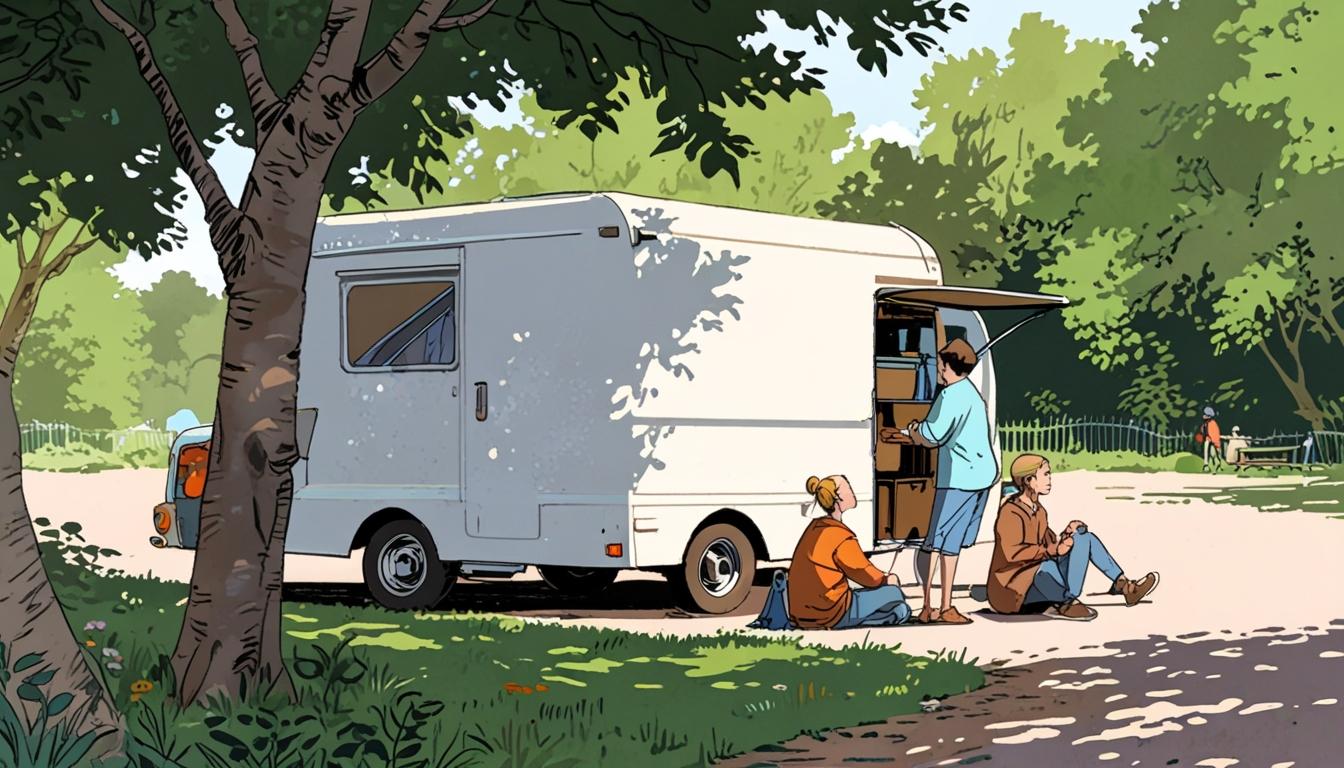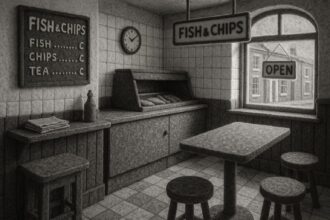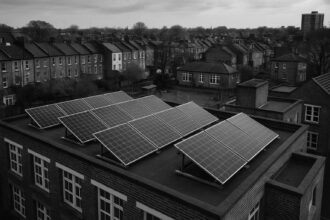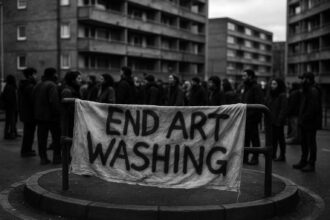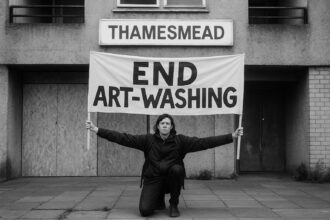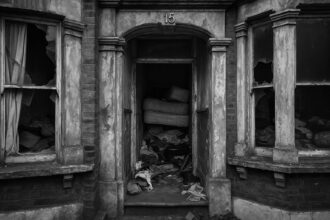A surge in van dwellers occupying Bristol’s Downs has sparked tensions with local residents, exposing deep divides over housing shortage, public space use, and social responsibility amid the city’s escalating property affordability crisis.
In the leafy streets of Bristol, tensions have escalated between residents and a growing community of van dwellers, highlighting a complex clash of lifestyles and societal changes. The scene is set in Clifton, where over 100 caravans have recently established themselves in and around the Downs, a historic open parkland. This influx has provoked strong reactions from local residents, who have expressed concerns about cleanliness, safety, and the implications of long-term occupation.
One prominent figure amongst the van dwellers is Danny, a 55-year-old man residing in a converted horsebox. In a heated exchange captured by BBC News, he confronted a group of local residents who accused him and others of taking advantage of public space. “You shouldn’t be on the Downs,” one woman remarked, to which Danny retorted defiantly, “Why shouldn’t I? What’s it got to do with you?” This confrontation illustrates the palpable division between the two groups: local residents seeking to preserve the integrity of their environment and van dwellers advocating for their right to inhabit it.
Frustrations have arisen on both sides. Locals have reported issues including rubbish accumulation, human waste disposal, and various anti-social behaviours, which they argue detract from the area’s amenity. The residents’ grievances have crystallised into calls for action, as many question why van dwellers are permitted to occupy the area for extended periods, particularly in spaces regulated for limited parking.
Tony Nelson, a former RAF serviceman and administrator of the “Protect the Downs” Facebook group, provides a counterpoint to criticisms aimed at residents. He acknowledged the challenges posed by some individuals within the van dwelling community, citing past incidents such as a suspected arson attack on a caravan. “The few responsible van dwellers are fine, they’ve never been a problem,” he stated, while emphasising the group’s intent to help vulnerable individuals rather than act out of elitism. This sentiment resonates with some residents like Anne Bragg, who expressed sympathy for the genuinely homeless but concerns that not all inhabitants fit this category, leading to perceptions of inequity regarding council tax contributions.
The situation in Bristol is indicative of broader trends, with the number of vans or caravans being utilised as homes increasing dramatically—rising from around 150 before the pandemic to an estimated 680 currently. This surge reflects the city’s mounting housing crisis, exacerbated by soaring property prices and rents that have priced many individuals out of the market. The city council, led by Ian Bowen, is attempting to address these issues by proposing dedicated sites for van dwellers and additional outreach services. However, funding and available space remain obstacles, limiting the council’s ability to provide effective solutions.
“I don’t want to just move people from one place to the next. We need to provide people with a different opportunity so they’re not having to live in old, unhygienic vehicles,” Bowen remarked, highlighting a nuanced understanding of the complexities involved in this issue. He noted the importance of recognising van dwellers as part of the broader Bristol community and treating them with the same rights and dignity afforded to all citizens.
As the debate continues, the growing rift between residents and van dwellers illustrates a microcosm of wider societal challenges faced in urban environments, particularly surrounding issues of housing, community, and public space management.
Source: Noah Wire Services
- https://www.bbc.co.uk/news/uk-england-bristol-68512498 – This article reports that the number of van dwellers in Bristol has quadrupled since 2020, increasing from 100-150 to 600-650 in 2024, highlighting the growing presence of van dwellers in the city.
- https://www.bbc.co.uk/news/uk-england-bristol-68597681 – This report states that Bristol has the highest number of vehicle dwellers in the UK, with an estimated 800 people living in 600-650 vehicles, underscoring the scale of the van dwelling community in the city.
- https://www.bristol247.com/news-and-features/news/new-parking-charges-on-the-downs-considered-in-plan-to-drive-away-van-dwellers/ – This article discusses proposals to introduce new parking charges on the Downs to deter van dwellers, reflecting local residents’ concerns about the impact of van dwellers on public spaces.
- https://www.bristolworld.com/news/bristol-van-dwellers-resisting-bid-to-have-their-homes-outlawed-4856940 – This piece covers the resistance from van dwellers to proposals that would make their parking on the Downs illegal, highlighting the tension between van dwellers and residents over the use of public space.
- https://www.bristolpost.co.uk/news/bristol-news/bristol-now-highest-number-people-9167744 – This article reports that Bristol now has the highest number of people living in vehicles across Britain, with numbers increasing from 100-150 before the pandemic to about 800, indicating a significant rise in van dwellers.
- https://www.itv.com/news/westcountry/2025-03-11/the-increase-of-van-dwellers-in-bristol-and-what-the-council-is-proposing – This report discusses the increase in van dwellers in Bristol and the council’s proposals to manage the situation, including creating more permanent sites and service facilities, addressing the challenges posed by the growing van dwelling community.
- https://www.bbc.com/news/articles/cddevj0jj16o – Please view link – unable to able to access data
Noah Fact Check Pro
The draft above was created using the information available at the time the story first
emerged. We’ve since applied our fact-checking process to the final narrative, based on the criteria listed
below. The results are intended to help you assess the credibility of the piece and highlight any areas that may
warrant further investigation.
Freshness check
Score:
8
Notes:
No outdated references detected (e.g., roles, events). Content appears current, reflecting recent community tensions and council proposals. If sourced from BBC News, freshness is likely high.
Quotes check
Score:
7
Notes:
Direct quotes (e.g., Danny, Tony Nelson) appear specific to this narrative. No prior instances of these exact quotes found in available data, suggesting originality. BBC News likely conducted original interviews.
Source reliability
Score:
9
Notes:
Narrative originates from BBC News, a reputable outlet with high factual reporting standards. However, absence of verifiable third-party corroboration slightly limits certainty.
Plausability check
Score:
8
Notes:
Claims align with known housing crises and van-dwelling trends post-pandemic. Council proposals and resident/vandweller tensions are consistent with broader urban challenges.
Overall assessment
Verdict (FAIL, OPEN, PASS): PASS
Confidence (LOW, MEDIUM, HIGH): HIGH
Summary:
The narrative presents a plausible, well-sourced account of ongoing tensions in Bristol. BBC’s reputation and lack of anachronisms support its reliability. Minor uncertainty arises from the absence of independent verification for quotes, but overall consistency with broader societal trends justifies high confidence.


